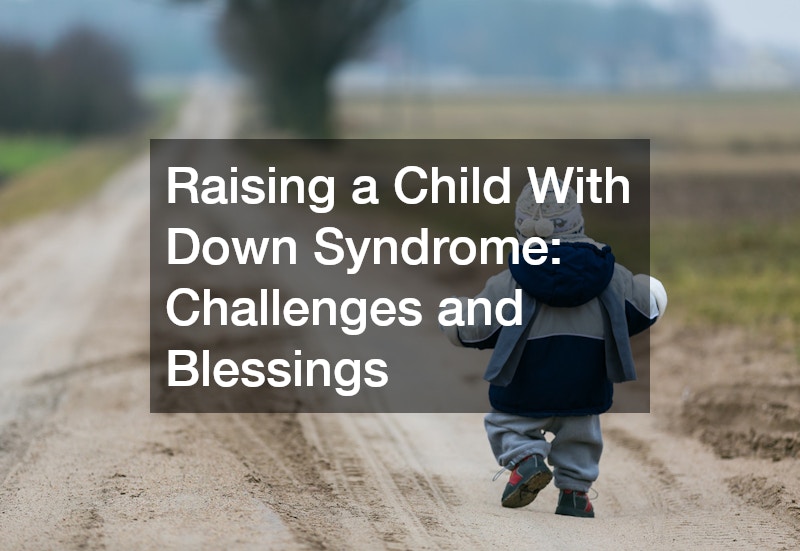The journey of raising a child with Down syndrome is marked by unique challenges and profound blessings. This article explores vital aspects of parenting a child with this condition, addressing the most common questions and offering insights into the multifaceted experiences involved.
1. What Are the Early Signs and Diagnosis of Down Syndrome?
1.1 Understanding Down Syndrome
Down syndrome, also known as trisomy 21, is a genetic disorder caused by the presence of an extra 21st chromosome. This condition affects development and can lead to physical and intellectual disabilities.
However, it’s important to acknowledge the wide range of abilities and talents each individual with Down syndrome possesses. The condition was named after Dr. John Langdon Down, who first categorized it in 1866. Today, advancements in medical research and support services have greatly enhanced the quality of life for individuals with Down syndrome.
1.2 Identifying Early Signs
Early signs of Down syndrome can often be noticed at birth or during infancy. Physical characteristics might include hypotonia or poor muscle tone, a flat facial profile, and upward slanting eyes. These signs can vary significantly between individuals. Developmental milestones such as sitting, crawling, and walking typically occur later in children with Down syndrome compared to their peers. Awareness of these early signs can help parents seek timely medical evaluation and support.
1.3 Diagnostic Procedures
Diagnosis of Down syndrome can occur prenatally or postnatally. Prenatal screening tests include non-invasive methods, such as blood tests and ultrasounds, which help assess the likelihood of the condition. Confirmatory diagnostic tests, like amniocentesis, involve analyzing the chromosomes of fetal cells. Postnatally, a physical examination and a chromosomal test called a karyotype are used to confirm the diagnosis. Early diagnosis is crucial for planning interventions and support.
1.4 Genetic Counseling
Genetic counseling is an essential resource for families expecting a child with Down syndrome. It provides information and support regarding the genetic aspects of the condition. Genetic counselors can help parents understand the likelihood of Down syndrome in future pregnancies. This service can also assist in navigating the emotional and practical implications of the diagnosis. Informed decision-making is a critical component of genetic counseling.
1.5 Communicating the Diagnosis
Communicating a diagnosis of Down syndrome is a sensitive process that requires compassion and care. Healthcare providers play a crucial role in delivering the news with empathy and clarity. Parents often experience a range of emotions, including shock, sadness, and uncertainty about the future. Support from family, healthcare professionals, and counseling services can be invaluable during this time. Open and honest communication can help families adapt and plan for the future.
2. How Can Parents Support Development and Learning?
2.1 Early Intervention Programs
Early intervention programs are integral to supporting the development of children with Down syndrome. These programs typically involve a team of specialists who work with the child to enhance physical, cognitive, and social skills. Participation can positively influence learning outcomes and pave the way for future academic success. Engaging in early intervention exercises also fosters greater independence and self-confidence in children. Utilizing these services early in a child’s life can have long-term benefits and is advocated by many healthcare providers.
2.2 Adapting Learning Environments
Creating an inclusive and supportive learning environment is essential for children with Down syndrome. Educators and parents can collaborate to adapt teaching strategies and materials to meet individual needs. Using visual aids, interactive learning tools, and hands-on activities can enhance comprehension and retention. Recognizing and celebrating small achievements can also boost motivation and self-esteem. An adapted learning environment not only supports education but also encourages positive social interactions with peers.
2.3 Encouraging Social Interaction
Social interaction is a crucial aspect of development for children with Down syndrome. Engaging in group activities, playdates, and community events can enhance social skills and friendships. Parents can support these interactions by modeling positive social behaviors and celebrating their child’s efforts. Encouraging participation in inclusive extracurricular activities can further promote a sense of belonging and self-worth. Through social interactions, children can develop meaningful relationships and enjoy enriched emotional well-being.
2.4 Speech and Language Development
Speech and language development can present unique challenges for children with Down syndrome. Early intervention by speech therapists can greatly enhance communication skills. These professionals work on articulation, vocabulary expansion, and social communication strategies. Parents can support speech development by engaging in frequent verbal interactions and reading activities. Aiding communication through sign language or augmentative and alternative communication (AAC) devices can also be beneficial.
2.5 Monitoring Physical Development
Monitoring physical development is an important aspect of caring for children with Down syndrome. Regular physical activity can improve muscle tone, coordination, and overall health. Physical and occupational therapists can provide tailored exercises to enhance gross and fine motor skills. Encouraging participation in sports or recreational activities can also be beneficial in promoting physical well-being. Vigilant attention to physical development supports a child’s health and active lifestyle.
3. What Are the Health Concerns and How Can They Be Managed?

3.1 Recognizing Common Health Issues
Individuals with Down syndrome are at an increased risk for certain health issues. These may include heart defects, respiratory and hearing problems, and thyroid conditions. Regular medical check-ups and screenings are essential for early detection and management. Awareness of common health issues allows for proactive healthcare strategies. With appropriate medical care, many individuals with Down syndrome live healthy and fulfilling lives.
3.2 Regular Health Screenings
Regular health screenings play a crucial role in managing the health of children with Down syndrome. These screenings enable healthcare providers to detect potential issues early and implement timely interventions. Vaccinations, vision tests, hearing assessments, and dental check-ups are among the recommended routine screenings. Maintaining an up-to-date health record and ensuring consistent follow-up appointments is vital for continuous care. Early intervention in health matters can significantly improve quality of life and developmental outcomes.
3.3 Building a Healthcare Team
Establishing a multidisciplinary healthcare team is essential in addressing the diverse needs of children with Down syndrome. This team may include pediatricians, cardiologists, audiologists, and other specialists as needed. Collaborative care coordination ensures comprehensive and personalized treatment plans. Regular communication between the healthcare team and family members fosters informed decision-making. A dedicated healthcare team contributes to optimal management of health and developmental challenges.
3.4 Nutritional Needs
Children with Down syndrome may have specific nutritional needs to support their growth and development. A balanced diet rich in essential vitamins and minerals is vital for optimal health. Consulting with an experienced nutritionist can help tailor dietary plans to individual needs. Ensuring adequate hydration and addressing feeding difficulties are also important aspects of care. Proper nutrition supports energy levels, cognitive function, and overall well-being.
3.5 Managing Emotional and Mental Health
Emotional and mental health care is a key component of the well-being of individuals with Down syndrome. Supportive environments and therapeutic interventions can address potential behavioral or emotional challenges. Counseling services for both the individual and family can provide coping strategies and emotional support. Encouraging self-expression through creative activities can enhance emotional resilience and self-esteem. Fostering a positive and nurturing environment promotes mental wellness and healthy self-identity.
4. How Can Parents and Families Find Support?
4.1 Joining Support Groups
Joining support groups can be a valuable resource for families raising a child with Down syndrome. These groups offer emotional support, practical advice, and a sense of community among parents and caregivers. Sharing experiences and challenges can provide comfort and camaraderie. Support groups may also organize workshops and events that promote education and advocacy. Families often find strength and encouragement in the connections formed within these communities.
4.2 Accessing Community Resources
There are numerous community resources available to support families of children with Down syndrome. These may include early intervention programs, educational services, and recreational activities. Accessing these resources can help parents ensure that their child receives comprehensive support and care. Community organizations often provide information about local programs and assistance in navigating services. Engaging with these resources can enhance a child’s quality of life and promote inclusion.
4.3 Cultivating a Strong Support System
Cultivating a strong support system is crucial for the well-being of families raising a child with Down syndrome. This might include the involvement of extended family, friends, and community members. Open communication and mutual support among family members can help manage stress and foster a positive environment. In seeking emotional support, parents may find family counseling beneficial. A robust support system empowers families to face challenges with resilience and hope.
4.4 Advocacy and Awareness
Advocacy and awareness efforts can greatly impact the lives of individuals with Down syndrome. Promoting understanding and acceptance within communities fosters an inclusive society. Parents and families play a vital role in advocating for their children’s rights and opportunities. Participating in awareness campaigns and community events can enhance visibility and reduce stigma. Advocacy efforts aim to ensure that individuals with Down syndrome have equal access to education, employment, and social experiences.
4.5 Coping with Stress and Emotional Challenges
Parents and caregivers of children with Down syndrome may face unique stressors and emotional challenges. Practicing self-care and seeking support can help manage these pressures effectively. Mindfulness practices, relaxation exercises, and time for personal interests contribute to emotional well-being. Counseling or support groups can provide a safe space for parents to express concerns and explore coping strategies. Accepting and addressing emotional challenges is key to a balanced and healthy caregiving experience.
5. What Are the Long-term Outlooks and Opportunities?
5.1 Education and Career Opportunities
Individuals with Down syndrome are increasingly accessing education and career opportunities. Mainstream educational settings and vocational training programs foster skill development and independence. Legal protections and advocacy have broadened access to inclusive education environments. With appropriate support and encouragement, individuals with Down syndrome can pursue fulfilling careers. Celebrating diverse talents and contributions highlights the potential and accomplishments of individuals with this condition.
5.2 Fostering Independence
Fostering independence in individuals with Down syndrome is a foundation of successful adulthood. Life skills education, such as self-care, money management, and daily living activities, enhances autonomy. Families and educators play a crucial role in promoting decision-making and self-advocacy. Celebrating incremental progress and achievements builds confidence and self-efficacy. Independent living opportunities, with appropriate support, further nurture self-reliance and personal growth.
5.3 Social Inclusion and Friendships
Social inclusion and friendships significantly contribute to the quality of life for individuals with Down syndrome. Participation in social groups, clubs, and community activities encourages meaningful interactions. Friendships developed through shared activities foster a sense of belonging and companionship. Encouraging diverse social experiences enriches personal development and broadens perspectives. Celebrating individual differences and promoting inclusivity benefits the entire community.
5.4 Legal and Financial Planning
Legal and financial planning is essential to secure the future of individuals with Down syndrome. This may include establishing special needs trusts, guardianship arrangements, and healthcare directives. Engaging with legal and financial advisors can ensure that plans are tailored to meet individual needs and aspirations. Planning for future expenses, such as education, housing, and medical care, provides peace of mind for families. Comprehensive planning supports long-term stability and security.
5.5 Celebrating Achievements and Milestones
Celebrating achievements and milestones brings joy and pride to families of individuals with Down syndrome. Recognition of accomplishments, both big and small, reinforces self-worth and motivation. Milestones vary greatly, and each achievement is a testament to perseverance and support. Families can commemorate these moments through special celebrations or keepsakes. By acknowledging progress and growth, families embrace the unique journey and joys of raising a child with Down syndrome.
Raising a child with Down syndrome comes with unique challenges, but it also offers enriching experiences and immense joy. By understanding the condition, embracing support systems, and staying informed, parents can nurture their child’s development and well-being, creating a fulfilling and inclusive life for them.

